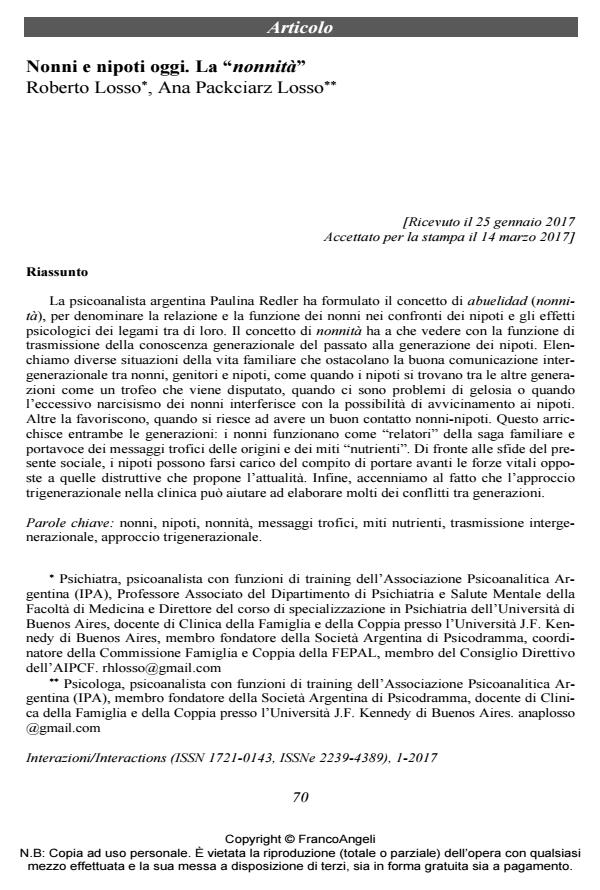Grandparents and grandchildrens today. The "grandparenthood"
Journal title INTERAZIONI. Clinica e ricerca psicoanalitica su individuo-coppia-famiglia
Author/s Roberto Losso, Ana Packciarz Losso
Publishing Year 2017 Issue 2017/1
Language Italian Pages 9 P. 70-78 File size 145 KB
DOI 10.3280/INT2017-001004
DOI is like a bar code for intellectual property: to have more infomation
click here
Below, you can see the article first page
If you want to buy this article in PDF format, you can do it, following the instructions to buy download credits

FrancoAngeli is member of Publishers International Linking Association, Inc (PILA), a not-for-profit association which run the CrossRef service enabling links to and from online scholarly content.
The Argentine psychoanalyst Paulina Redler formulated the concept of abuelidad (grandparenthood), to denominate the relation and function of the grandparents and their grandchildren and the psychological effects of the relations between them. The concept of abuelidad is related to the function of transmission of the generational knowledge of the past to the grandchildren’s generation. We refer to different situations of the family life that in-terfere with the good intergenerational communication between grandparents, parents and grandchildren like the cases in which grandchildren are in the middle of the other generations as a trophy in dispute, when there are problems of jealousy or when the excessive narcissism of grandparents interferes with the possibility of approaching their grandchildren. In other cases, communication is favored when it is possible to have a good contact between grandparents and grandchildren, which is a situation that enriches both generations: the grandparents function as both narrators of the familiar saga and spokespersons of the trophic messages of the origins, of nutritious myths. Facing the challenges of the social present, grandchildren can take charge of the task of going ahead with the vital forces opposed to the destructive ones proposed at present. Finally, we comment that in clinical practice the tri-generational approach can help many of the conflicts between generations.
Keywords: Grandparents, grandchildren trophic messages, nutritive myths, intergenerational transmission, tri-generational approach
Roberto Losso, Ana Packciarz Losso, Nonni e nipoti oggi. La "nonnità" in "INTERAZIONI. Clinica e ricerca psicoanalitica su individuo-coppia-famiglia" 1/2017, pp 70-78, DOI: 10.3280/INT2017-001004